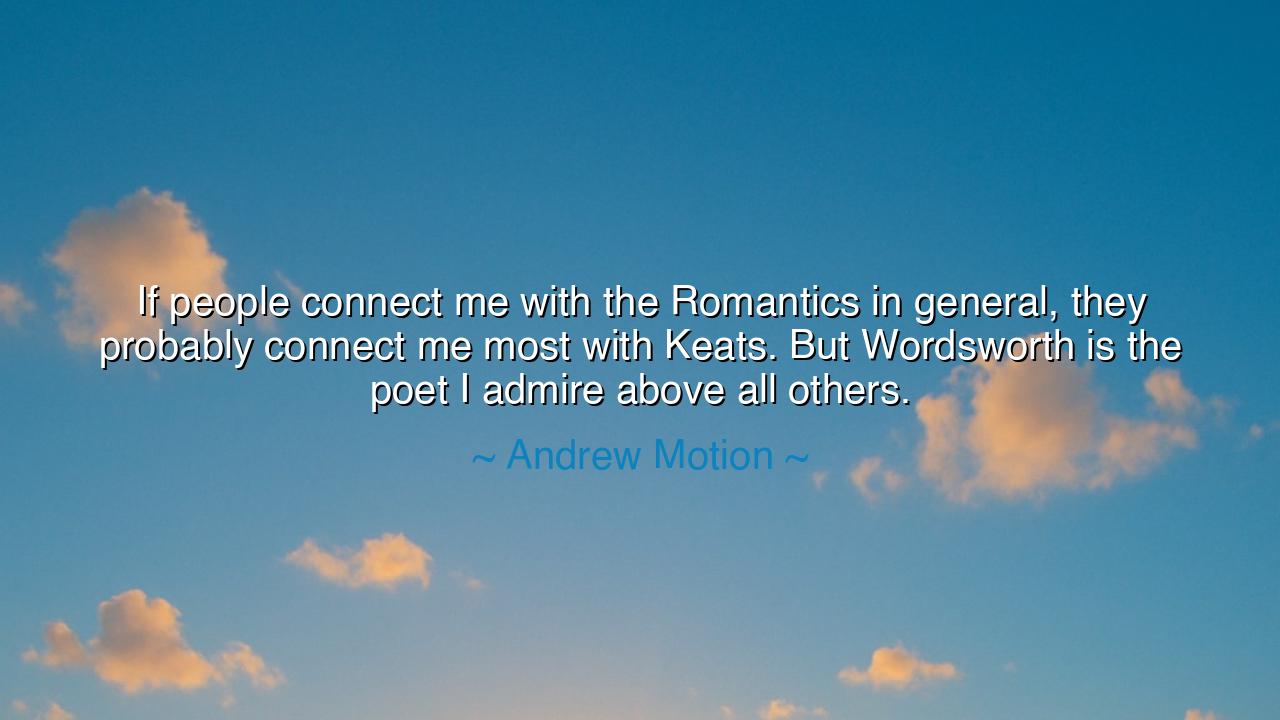
If people connect me with the Romantics in general, they probably
If people connect me with the Romantics in general, they probably connect me most with Keats. But Wordsworth is the poet I admire above all others.






In the words of Andrew Motion, "If people connect me with the Romantics in general, they probably connect me most with Keats. But Wordsworth is the poet I admire above all others," we are invited into a reflection on the enduring power of Romantic poetry, where the struggle between personal emotion and nature’s vast beauty creates a timeless dialogue about human existence. Motion's statement reveals his deep connection to the Romantic movement—a period marked not just by revolutionary artistic expression, but by a profound yearning to understand humanity’s place in the world through the lens of nature and the self. The connection between Motion and Keats, with his intoxicating idealism and emotional depth, is clear, but it is the philosophical grounding and spiritual clarity of Wordsworth that ultimately resonates with him more deeply.
The Romantic period, which flourished in the late 18th and early 19th centuries, was an era where poets and artists sought to break free from the constraints of reason and classical forms. They turned inward to explore the power of emotion, the magnificence of nature, and the complexities of the individual experience. John Keats, with his celebration of the fleeting and transcendent beauty in life, wrote of the human condition with a tenderness and passion that continues to resonate. His famous line from Ode on a Grecian Urn—"Beauty is truth, truth beauty"—captures the romantic ideal of art, where beauty and truth converge into something eternal. However, while Keats embodied the romantic idealism of fleeting beauty, Wordsworth provided the intellectual depth and grounding that Motion himself finds most admirable.
William Wordsworth, as Motion acknowledges, is the poet who represents the more reflective, philosophical side of the Romantic movement. Wordsworth believed that nature was not merely a backdrop for human life but a source of deep wisdom and spiritual guidance. His most famous works, such as Lines Composed a Few Miles Above Tintern Abbey, explore the deep connection between humanity and the natural world, suggesting that the peace and clarity of the natural world provide insight into the soul. For Wordsworth, nature was not just an aesthetic experience, but a means to reach a higher understanding of self and truth. In this way, he offered something different from Keats’s more sensual, emotional expressions—Wordsworth’s poetry was a meditation on the interconnection between human existence and the world itself.
In the ancient world, philosophers like Heraclitus and Socrates also explored the relationship between humanity and the natural world, though their approaches were different from the Romantics. Heraclitus, with his view of the ever-changing nature of life, saw the world as a constant flow, where unity and opposites coexisted. In his reflections, we can see a precursor to the Romantic view that life and nature are inextricably linked. Socrates, too, while focused on reason and ethics, acknowledged the importance of understanding the world’s truths, not just through intellect, but through a spiritual connection with the world. Both philosophers, in their own ways, sought deeper truths about life and nature, much like Wordsworth did, but with a greater focus on the individual’s relationship with the world around them.
Motion’s admiration for Wordsworth, then, lies in this more philosophical and reflective side of Romanticism, where nature is not just the backdrop for personal emotion, but a teacher of wisdom and truth. Wordsworth’s work encourages us to find a sense of peace and clarity in the world, urging us to look beyond the chaos of modern life and seek a deeper connection with the natural world and its profound lessons. This romantic ideal does not diminish the value of Keats’s emotional intensity, but instead complements it by suggesting that while beauty and fleeting moments may stir the soul, it is the quiet, thoughtful contemplation of nature that brings true understanding.
The lesson in Motion’s words is one of balance between the romantic passions of Keats and the deeper philosophical grounding of Wordsworth. Both approaches to life offer valuable insights into the human experience, but they must be balanced to live fully and meaningfully. Passion without reflection can lead to an idealized but superficial understanding of the world; reflection without passion can become a detached, intellectual exercise. The true Romantic, as Motion embodies, understands that it is through emotion, reflection, and a deep connection to the world around us that we can discover truth and purpose.
In your own life, consider the importance of both emotion and reflection. Allow your passions to guide you, but do not neglect the quiet moments of introspection that can help you understand and connect with the world more deeply. Embrace the wisdom that Wordsworth offers: find peace and clarity in the natural world and allow it to inform your inner world. Like the ancients, who sought knowledge not only through reason but through a deep spiritual connection with the universe, seek to live your life with a sense of balance, grounded in both the beauty of the world around you and the depth of understanding you cultivate within.






AAdministratorAdministrator
Welcome, honored guests. Please leave a comment, we will respond soon